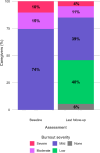Evaluating the Impact of Pediatric Digital Mental Health Care on Caregiver Burnout and Absenteeism: Longitudinal Observational Study
- PMID: 40576556
- PMCID: PMC12229275
- DOI: 10.2196/67149
Evaluating the Impact of Pediatric Digital Mental Health Care on Caregiver Burnout and Absenteeism: Longitudinal Observational Study
Abstract
Background: Caregivers of children with mental health challenges are at heightened risk for burnout and absenteeism. This strain affects both their well-being and work performance, contributing to widespread workplace issues. Digital mental health interventions (DMHIs) are increasingly used to support pediatric mental health, but their impact on caregiver outcomes remains underexplored.
Objective: This study aimed to explore the associations between caregiver burnout, absenteeism (ie, missing work), comorbid symptoms, and child mental health problems, and to assess whether caregiver burnout and absenteeism improved as their child participated in a pediatric DMHI.
Methods: This retrospective study included 6506 caregivers whose children (aged 1-17 years) received care from Bend Health, Inc, a pediatric DMHI providing digital-based therapy and coaching, digital content, and caregiver support. Caregiver burnout, absenteeism, comorbid symptoms, and child mental health symptoms were measured by monthly assessments. Cumulative link models were used to assess the associations of between child symptoms and caregiver outcomes and to assess changes in caregiver outcomes over the course of the DMHI. Analyses of baseline associations included the full sample (n=6506), while analyses of pre-post changes in caregiver outcomes were conducted in caregivers with elevated burnout (n=2121) and absenteeism (n=1327) who had an assessment after starting care.
Results: At baseline, 45.96% (2990/6506) of caregivers reported elevated burnout and 28.96% (1884/6506) reported elevated absenteeism. More severe burnout was associated with having a child with elevated symptoms of any type (all P<.01). More severe absenteeism was significantly associated with having a child with elevated symptoms of depression (z=3.33; P<.001), anxiety (z=3.96; P<.001), inattention (z=2.48; P=.013), and hyperactivity (z=2.12; P=.03). Burnout decreased for 68.64% (1456/2121) and absenteeism decreased for 87.26% (1158/ 1327). Greater months in care was associated with less severe caregiver burnout (z=-5.48; P<.001) and absenteeism (z=-6.74; P<.001).
Conclusions: DMHIs for children may reduce caregiver burnout and absenteeism. These findings emphasize the value of employers offering pediatric DMHIs as part of employee benefits, potentially enhancing workplace outcomes.
Keywords: adolescence; adolescents; child behavior; child behavioral health; children; digital; digital health; digital interventions; digital mental health intervention; digital technology; mental disorders; mental health; mental illnesses; pediatrics; teenagers; workplace outcomes; youth.
© Darian Lawrence-Sidebottom, Kelsey McAlister, Aislinn Brenna Beam, Rachael Guerra, Amit Parikh, Monika Roots, Donna McCutchen, Landry Goodgame Huffman, Jennifer Huberty. Originally published in JMIR Pediatrics and Parenting (https://pediatrics.jmir.org).
Conflict of interest statement
Figures


Similar articles
-
Impact of a pediatric digital mental health intervention on caregiver sleep and stress: A retrospective exploration of moderators of improvement.Digit Health. 2025 Jul 28;11:20552076251361589. doi: 10.1177/20552076251361589. eCollection 2025 Jan-Dec. Digit Health. 2025. PMID: 40735548 Free PMC article.
-
Sexual Harassment and Prevention Training.2024 Mar 29. In: StatPearls [Internet]. Treasure Island (FL): StatPearls Publishing; 2025 Jan–. 2024 Mar 29. In: StatPearls [Internet]. Treasure Island (FL): StatPearls Publishing; 2025 Jan–. PMID: 36508513 Free Books & Documents.
-
Digital interventions in mental health: evidence syntheses and economic modelling.Health Technol Assess. 2022 Jan;26(1):1-182. doi: 10.3310/RCTI6942. Health Technol Assess. 2022. PMID: 35048909 Free PMC article.
-
Education support services for improving school engagement and academic performance of children and adolescents with a chronic health condition.Cochrane Database Syst Rev. 2023 Feb 8;2(2):CD011538. doi: 10.1002/14651858.CD011538.pub2. Cochrane Database Syst Rev. 2023. PMID: 36752365 Free PMC article.
-
Falls prevention interventions for community-dwelling older adults: systematic review and meta-analysis of benefits, harms, and patient values and preferences.Syst Rev. 2024 Nov 26;13(1):289. doi: 10.1186/s13643-024-02681-3. Syst Rev. 2024. PMID: 39593159 Free PMC article.
References
-
- Henderson MD, Schmus CJ, McDonald CC, Irving SY. The COVID-19 pandemic and the impact on child mental health: a socio-ecological perspective. Pediatr Nurs. 2020;46(6):267–290.
-
- Parents under pressure: the US surgeon general’s advisory on the mental health & well-being of parents. US Surgeon General. 2024. [28-05-2025]. https://www.hhs.gov/sites/default/files/parents-under-pressure.pdf URL. Accessed.
LinkOut - more resources
Full Text Sources

